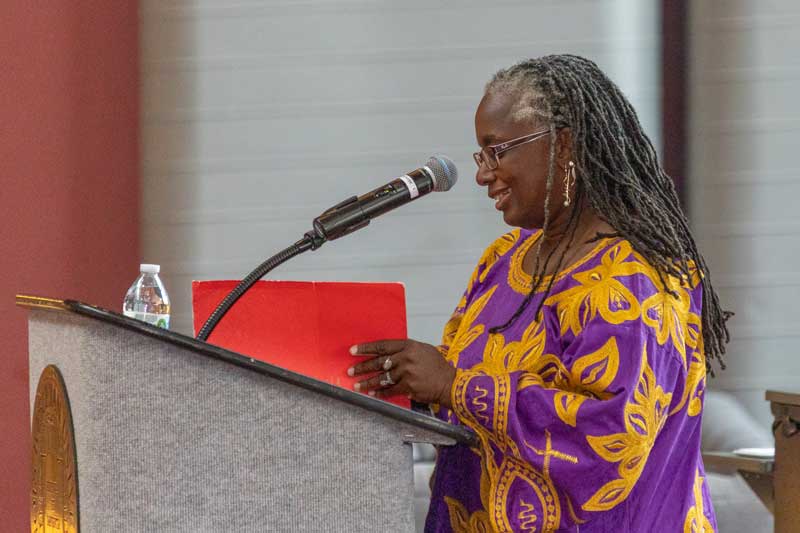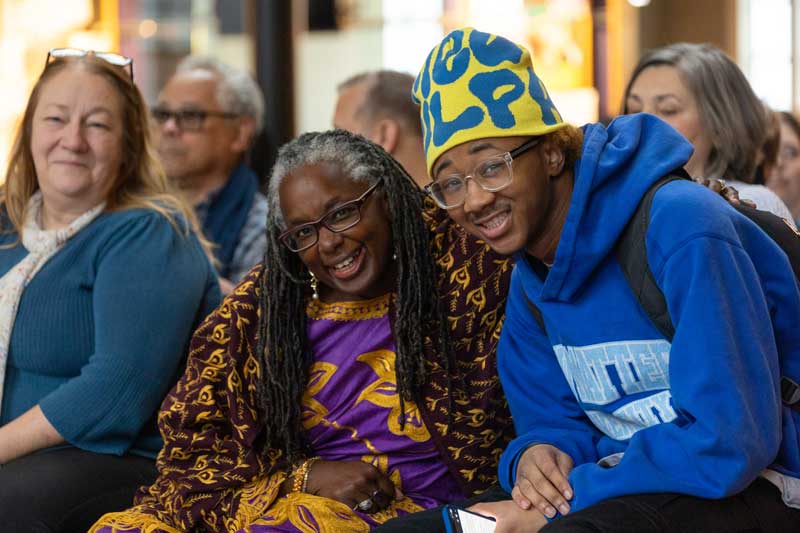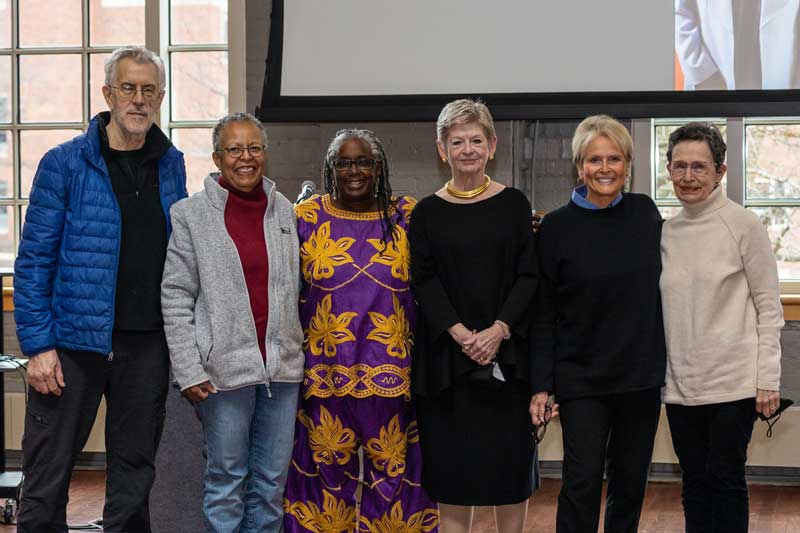Dr. Martin Luther King Jr. Day Teach-In 2023
 BLOOMINGTON, Ill.: Dr. Martin Luther King Jr. Teach-In this year featured professor
of Education and African-American studies Menah Pratt-Clarke. In her lecture titled
“Filling Places and Spaces with Our Voices,” Dr. Pratt-Clarke unpacked how the experiences
of black women are shaped by the intersection of their social identities: race, class,
and gender. In the lecture, Professor Pratt-Clarke shared the story of her mother,
Mildred Pratt, who played a determining role in Menah’s upbringing. She began her
insightful narrative with videos of Mildred reciting a Langston Hughes poem, “The
Negro Mother,” and singing a Negro spiritual, which she (Mildred) requested to be
shared in her funeral service held later in the Evelyn Chapel. Those clips combined
touching revelations of a mother determined to raise her kids happy no matter the
outside circumstances and eye-opening reflection on real challenges Black people faced
in the Jim Crow South. In her memoir “A Black Woman’s Journey from Cotton Picking
to College Professor,” Pratt-Clarke writes, “My mother, like so many black women before
and after her, carried a heavy load of responsibilities and challenges, but she always
made a way where there seemed to be no way.”
BLOOMINGTON, Ill.: Dr. Martin Luther King Jr. Teach-In this year featured professor
of Education and African-American studies Menah Pratt-Clarke. In her lecture titled
“Filling Places and Spaces with Our Voices,” Dr. Pratt-Clarke unpacked how the experiences
of black women are shaped by the intersection of their social identities: race, class,
and gender. In the lecture, Professor Pratt-Clarke shared the story of her mother,
Mildred Pratt, who played a determining role in Menah’s upbringing. She began her
insightful narrative with videos of Mildred reciting a Langston Hughes poem, “The
Negro Mother,” and singing a Negro spiritual, which she (Mildred) requested to be
shared in her funeral service held later in the Evelyn Chapel. Those clips combined
touching revelations of a mother determined to raise her kids happy no matter the
outside circumstances and eye-opening reflection on real challenges Black people faced
in the Jim Crow South. In her memoir “A Black Woman’s Journey from Cotton Picking
to College Professor,” Pratt-Clarke writes, “My mother, like so many black women before
and after her, carried a heavy load of responsibilities and challenges, but she always
made a way where there seemed to be no way.”
 Pratt-Clarke emphasized the power of education in transforming people’s lives and
overcoming systemic challenges. According to the lecturer, hard work, determination,
and access to education were crucial factors in Mildred’s rocky road from cotton-picking
to becoming a college professor. A black woman raised in rural poverty in the South,
Mildred Pratt earned a Ph.D. in education, becoming one of the first African American
women in the country to earn a doctorate in education. “One of the most important
lessons I have learned,” Pratt-Clarke writes, “is the power of education to transform
lives. Education has been my ticket to a better life, and I believe that it can be
a powerful force for change in our society. But we must also recognize that education
is not equally accessible to everyone, and that there are many barriers to success
that must be addressed.” She further argues that scholars and educators are responsible
for using their knowledge and skills to address social and political issues related
to race, class, and gender. She suggests this work requires engaging in difficult
conversations and working together to create a more just and equitable society.
Pratt-Clarke emphasized the power of education in transforming people’s lives and
overcoming systemic challenges. According to the lecturer, hard work, determination,
and access to education were crucial factors in Mildred’s rocky road from cotton-picking
to becoming a college professor. A black woman raised in rural poverty in the South,
Mildred Pratt earned a Ph.D. in education, becoming one of the first African American
women in the country to earn a doctorate in education. “One of the most important
lessons I have learned,” Pratt-Clarke writes, “is the power of education to transform
lives. Education has been my ticket to a better life, and I believe that it can be
a powerful force for change in our society. But we must also recognize that education
is not equally accessible to everyone, and that there are many barriers to success
that must be addressed.” She further argues that scholars and educators are responsible
for using their knowledge and skills to address social and political issues related
to race, class, and gender. She suggests this work requires engaging in difficult
conversations and working together to create a more just and equitable society.
 Pratt-Clarke concluded the Teach-In session with a call for speaking out, sharing
our unique stories, and filling spaces with our voices. She expressed a hope that
the story of her and her mother inspires others to pursue their dreams and work toward
equality and justice. “I believe that we all have the power to make a difference,
no matter where we come from or what obstacles we face,” Pratt-Clarke said.
Pratt-Clarke concluded the Teach-In session with a call for speaking out, sharing
our unique stories, and filling spaces with our voices. She expressed a hope that
the story of her and her mother inspires others to pursue their dreams and work toward
equality and justice. “I believe that we all have the power to make a difference,
no matter where we come from or what obstacles we face,” Pratt-Clarke said.
The Teach-In lecture was followed by a Q&A session that allowed students an opportunity to ask Professor Pratt-Clarke questions regarding her talk and memoir.
by Delilah Zhanguzinova